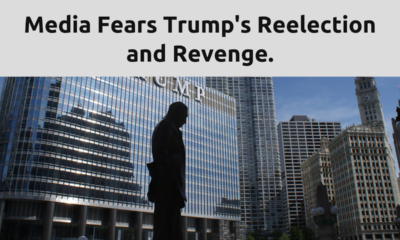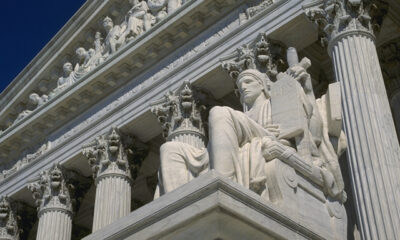Executive
Fifth Circuit hears argument on injunction appeal
The Fifth Circuit Court of Appeals heard argument today on Judge Doughty’s injunction against the government on social media censorship.
Yesterday afternoon, the Fifth Circuit Court of Appeals heard oral argument on the massive injunction against government censorship. After that, the Attorney General of Missouri dropped a thread giving his impressions of the argument session. He and fellow Attorney General Jeff Landry (Louisiana) agree that the government tried to “brazen it out” in defending censorship. And, considering which three judges heard the argument, the government is not likely to succeed.
Status of the appeal before the Fifth Circuit
The case of Missouri v. Biden is on an interlocutory appeal. (CourtListener maintains a docket page for that appeal, and another docket page at the District Court level.) Western Louisiana District Judge Terry A. Doughty imposed a sweeping injunction against government contacts with social-media platforms. The government not only appealed, but filed an emergency motion to stay the injunction pending that appeal. The injunction is now under administrative stay – but the Fifth Circuit expedited the appeal and scheduled oral argument for yesterday.
This case has primary, response, and rebuttal briefs from the parties, and fifteen friend-of-the-court briefs. The latest such brief came from Rep. Jim Jordan (R-Ohio) and eleven of his colleagues. Jordan laid before the court the findings of his Facebook Files series, now up to four such threads. These show the extent to which the government turned Facebook into a State actor.
Incredibly, four friend-of-the-court briefs come from third parties who like the idea of censorship. Though perhaps that’s not entirely so incredible. One brief comes from Alex Stamos and Renée di Resta, they of the infamous Stanford Internet Observatory. Those two officers, and that project, have figured prominently in the Twitter Files, and in the plaintiffs’ complaint and briefs. Another such brief came from the Attorneys General of twenty “Blue” States, and the District of Columbia.
The argument
The three judges who heard the argument were:
- Edith Brown Clement, senior judge, appointed by George W. Bush,
- Jennifer Walker Elrod, active judge, also appointed by George W. Bush, and
- Don R. Willett, active judge, appointed by Donald J. Trump.
Judge Clement has a reputation as a strict constructionist and a supporter of federalism. Judge Elrod’s biography on Wikipedia is very thin, but mentions a ruling (pre-Dobbs) requiring anyone performing abortions in Texas to get admitting privileges at a nearby hospital. Finally, Judge Willett emphasizes protection of individual liberty, including both religious and economic.
The argument session, that ran to 81 minutes, is available on YouTube.
Daniel Bentele Hahs Tenny, apparently a Special Assistant U.S. Attorney General, argued for the government. D. John Sauer (Special Assistant Attorney General of Louisiana) and Joshua Divine (Solicitor General of Missouri) argued for the plaintiff-appellees.
Tenny rather brazenly argued that no coercion occurred in any of the meetings between government agents and social-media moderation teams. He also said that, to have standing, the States must show a harm that might come to them in future. Specifically he said the censorship measures are not likely to recur – unless we have another “pandemic.”
All three judges took serious issue with his position. For example:
Tenny: The sort of pressure we’re talking about is, you know, relates to, the government is generically going to be angry; the government might make public statements against somebody… Yes, that might influence people. People might want to get on the president’s good side –
Elrod: What appears to be in the record are these irate messages from time to time, from high-ranking government officials, saying, “You didn’t do this yet” – and that’s my toning down the language. It’s like “Jump,’ and “How high?”
And when Tenny ventured to say:
If you were saying … “We’re going to impose some penalty,” that’s not the way you’d go about it. You wouldn’t say, “I’m really mad.” You’d just say, “Do this or else,” and the “or else” would be really clear.
Judge Elrod immediately reminded him that organized-crime syndicate bosses and their spokesmen routinely issue implied threats, that the party under threat understands without anyone saying the quiet part out loud.
Arguments in favor of the injunction
Mr. Sauer opened with a direct analogy to the government ordering publishers to burn books. This, he said, is what the censorship campaign amounted to.
The big sticking point that Mr. Tenny tried to raise, is that the platforms were acting voluntarily. To that point, Judge Elrod asked Mr. Sauer, “Does it matter if they want to do it anyway?” Sauer answered that very likely they did not “want to do it anyway.” But even if they did, it wouldn’t matter. Threats are threats, empty or not, necessary to the purpose or not.
Judge Clement asked about the difference between White House and FBI conduct. Sauer accused the FBI of deceiving people, as opposed to the White House’ veiled or not-so-veiled threats.
Joshua Divine mainly defended the standing of the States to sue the federal government. He addressed two kinds of harm to the States: takedowns of State posts, and censorship of anyone who might have an opinion on which a State might rely.
Andrew Bailey, Attorney General of Missouri, posted this thread on Platform X after oral argument concluded. Herewith the odd numbers:
Reaction was mostly favorable – except for some users who actually heaped scorn on Bailey. But other users were quick to shout them down. Here’s one example:
And another.
But most reaction was more along this line:
Analysis: the Fifth Circuit is likely to reinstate the injunction
Judges Clement and Elrod took care to make sure that Messrs. Sauer and Divine were properly defending their argument. They did ask Mr. Divine an important question: will the States someday sue the social-media platforms directly? Mr. Divine suggested they might file such an action, on the theory that censorship, no matter who practices it, harms everyone. But he admitted that they hadn’t decided to proceed against the platforms. (Of course, Laura Loomer is proceeding against X, formerly known as Twitter.)
But all three judges severely criticized Mr. Tenny, who seemed to be shading what the government said and did. Worse yet, Tenny said the government is not “likely” to practice censorship – except in another comparable national emergency.
This last illustrates the worst problem with the theory of national or other government emergency. Marcus Tullius Cicero used that theory to justify executing several Roman citizens without trial. Of all the political tools that contributed to the destruction of the Roman Republic, Cicero’s Senatus consultum ultimum was the worst. It led directly to Imperial decrees. And Daniel Bentele Hahs Tenny appeared to be arguing to leave in place a theory to support Presidential decrees.
The government cannot justify that censorship campaign. CNAV senses that the judges know it.
But more interestingly still, these judges, like Judge Doughty, seemed ready to find that the social-media companies merely followed orders. That will, of course, redound to the government’s shame. But again: not every company complied. Those that didn’t, deserve more credit.
Terry A. Hurlbut has been a student of politics, philosophy, and science for more than 35 years. He is a graduate of Yale College and has served as a physician-level laboratory administrator in a 250-bed community hospital. He also is a serious student of the Bible, is conversant in its two primary original languages, and has followed the creation-science movement closely since 1993.
-

 Civilization5 days ago
Civilization5 days agoCHAPTER 12: Seeding Race Wars
Space Is No Longer the Final Frontier—Reality Is [forthcoming release May 2024] -

 Constitution4 days ago
Constitution4 days agoPrecinct Strategy scores again
-

 Education4 days ago
Education4 days agoTitle IX revision sparks State revolts
-

 Civilization2 days ago
Civilization2 days agoLegacy media already assume Trump wins
-

 Civilization3 days ago
Civilization3 days agoSCOTUS Is Last Bulwark Against Critical Legal Studies
-

 News4 days ago
News4 days agoTime to Fly – Really Fast
-

 Education4 days ago
Education4 days agoThe Road Back to Normalcy Starts Where the Problem Began: College Campuses
-

 Civilization3 days ago
Civilization3 days agoWhat 10 Years of U.S. Meddling in Ukraine Have Wrought (Spoiler Alert: Not Democracy)












